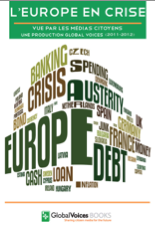 Our ebook “EU in crisis” is finally available in French!
Our ebook “EU in crisis” is finally available in French!
Free download in three formats:
- PDF (3,3 MB)
- Mobipocket (1,5 MB)
- ePub (1,4 MB)
Enjoy!

 Our ebook “EU in crisis” is finally available in French!
Our ebook “EU in crisis” is finally available in French!
Free download in three formats:
Enjoy!
Here are some statistics about ebooks reads and downloads so far. Please note that data from this GV Books website are approximate and overall it received more than 500 visits since its inception (May 30, 2012). Data from the three external platforms are accurate and cover the first 10 days of our presence there (mid-February 2013).
GV Books:
– “EU in crisis” dwnlds in english: 40 pdf + 5 epub + 4 mobi
– “African Voices…” dwnlds in english: 22 pdf + 3 epub + 2 mobi
Internet Archive:
– “EU in crisis” (pdf): 11 dwnlds in english, 16 in arabic, 7 in spanish, 5 in italian, 5 in portuguese;
– “African Voices…” (pdf): 9 dwnlds in english, 7 in italian
Scribd:
– “EU in crisis”: 167 reads (+ 3 readcasts, 19 dwnlds) in english, 144 in arabic, 66 (+ 4 readcasts, 3 dwnlds) in italian, 50 (+ 1 dwnld) in portuguese, 29 (+ 1 readcast, 1 dwnld) in spanish
– “African Voices…”: 178 reads (+ 2 readcasts, 12 embed views, 1 dwnld) in english, 102 reads in italian
Issuu:
– “EU in crisis”: 7 impressions in english, 24 in arabic, 5 in italian, 3 in portuguese, 2 in spanish
– “African Voices…”: 38 in english, 4 in italian.
 Our second ebook “African Voices of Hope and Change” is now available also in Italian — Africa: Voci di speranza e cambiamento.
Our second ebook “African Voices of Hope and Change” is now available also in Italian — Africa: Voci di speranza e cambiamento.
You can download it for free in three different formats:
A special thanks to our Italian translators involved in this project: Elena Marrone, Giorgia Lanciotti, Juana Romandini, Katia Gerussi, Manuela Beccati, Manuela Dal Castello, Simona Galentino, Stefania Gliedman, Stefania Greci, Valentina Di Bennardo, Valentina Gazzola. And thanks to Mohamed Adel for his exciting technical support!
Please spread the word in your glocal circles — e grazie mille 😉
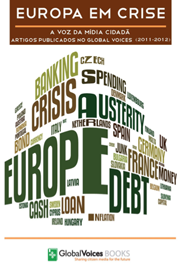 Pleased to announce that our ebook Eu in crisis is now available also in Portuguese!
Pleased to announce that our ebook Eu in crisis is now available also in Portuguese!
You can download it in the usual three formats:
Thanks everyone! And let your social circles know 😉
Here are a few excerpts from the introduction of our new ebook, African Voices Of Hope and Change — enjoy!
At the start of the new millennium, it felt as though the African continent was essentially written off by the international community. The Economist magazine even ran a cover story in May 2000 dubbing Africa “The Hopeless Continent”. The bottom line was that given the difficulties the world saw in helping African nations overcome their conflicts and economic despair, we might as well just give up on the entire continent.
How quickly things have changed since then.
Recent statistics suggest that nine of the fastest-growing economies in the world are in Sub-Saharan Africa. The Economist acknowledged the turnaround in December 2011, featuring another cover story on Africa, this time calling it the “Rising” continent and with a far different tagline: “the continent’s impressive growth looks likely to continue”.
[…] Yet for all the optimism and growth potential, the road to sustainable prosperity is fraught with perilous cliffs and roadblocks. According to the International Monetary Fund (IMF), the Sub Saharan Africa’s Gross Domestic Product (GDP) grew “by 5.5 per cent in 2011 and 5.8 per cent projected in 2012 (in real terms)”. However, the five countries with the highest income inequality in the world, based on the World Bank GINI coefficient, are all from the same region (Seychelles, Comoros, Namibia, South Africa and Namibia).
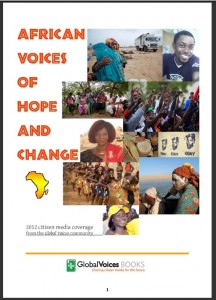 Yes, our new ebook is ready! This title is dedicated to the Africa’s Sub-Saharan region, which remains a major focus for Global Voices: only in 2012 we produced almost 800 posts on various issues and people of that region alone. Here we gathered 13 of them covering stories and people about Senegal, Uganda, Mozambique, Guinea-Bissau, Ghana, Ethiopia, Nigeria, Mauritania, Kenya, Angola and other countries.
Yes, our new ebook is ready! This title is dedicated to the Africa’s Sub-Saharan region, which remains a major focus for Global Voices: only in 2012 we produced almost 800 posts on various issues and people of that region alone. Here we gathered 13 of them covering stories and people about Senegal, Uganda, Mozambique, Guinea-Bissau, Ghana, Ethiopia, Nigeria, Mauritania, Kenya, Angola and other countries.
Thanks to Mohamed Adel for technical support and to those who variously contributed to articles selected for this e-book: Afef Abrougui, Ahmed Jedou, Anna Gueye, Eleanor Staniforth, Endalk, James Propa, Kofi Yeboah, Lova Rakotomalala, Nwachukwu Egbunike, Richard Wanjohi, Sara Gold, Sara Moreira, and Ndesanjo Macha.
This e-book is available in two languages:
English:
Italian:
And spread the word in your glocal circles 😉
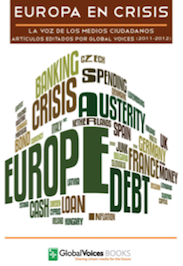 …And here it is our first ebook in Spanish too!
…And here it is our first ebook in Spanish too!
You can download it in the usual three formats:
Enjoy… and spread the word 😉
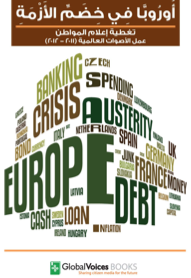 Thanks to a coordinating and output effort by Mohamed Adel, here is the Arabic version of our first ebook EU in Crisis!
Thanks to a coordinating and output effort by Mohamed Adel, here is the Arabic version of our first ebook EU in Crisis!
Please note that, as Mohamed points out, most ePub readers DO NOT support Arabic: «It works well on iBooks and for Android we tried it on an app based on “FBReader”, called Android Arabic Reader, while another is the Moon+ Reader».
You can download it in three different formats:
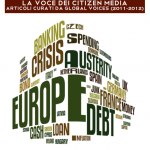 Yes: our first ebook “EU in Crisis” is now available also in Italian!
Yes: our first ebook “EU in Crisis” is now available also in Italian!
You can download it in three different formats:
Also, stay tuned for other upcoming versions: in Arabic, Portuguese, Spanish and French (in order of readiness). Bravi! to our teams of volunteer Lingua translators.
Pssstt: fai girare la voce, spread the word to all your Italian-reading contacts 😉
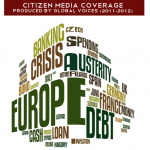 Curious about the actual content of our first ebook on “EU in Crisis”? Here is an extract from the introduction and a few pictures. Please download it, pass it around and spread the word!
Curious about the actual content of our first ebook on “EU in Crisis”? Here is an extract from the introduction and a few pictures. Please download it, pass it around and spread the word!
From the introduction:
Since December 2007, a recession has been affecting the world economy along with national political and social structures. This global recession took a particularly sharp downward turn in September 2008, particularly in the US market, where persistent high unemployment remains, along with low consumer confidence, the continuing decline in home values and increase in foreclosures and personal bankruptcies, an escalating federal debt crisis, inflation, and rising petroleum and food prices. Among others, a report released by Bloomberg in 2009 stated that US $14.5 trillion (or 33 percent) of value of global companies has been erased since the crisis began.

Midnight at Puerta del Sol. Madrid, May 19. Image source: Mikel el Prádanos
As expected, this recession spilled over to most of European countries ), reflecting the assessment that the global financial crisis presents a serious threat to international stability. Until September 2008, European policy measures were limited to a small number of countries (Greece, Spain and Italy), while the European Commission proposed a 200 Euro billion stimulus plan to be implemented at the European level by the countries. The G-20 countries met in a summit held on November 2008 in Washington to address the economic crisis. Followed by another G-20 summit held in London on April 2009. Despite various intervention measures implemented in October 2011 and February 2012, several EU countries are still unable to re-finance their government debt without the assistance of third parties.